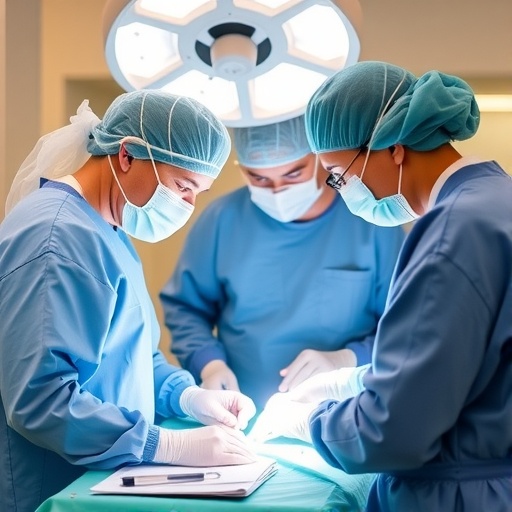Singapore General Hospital Inaugurates Centre of Excellence for Robotic-Assisted Orthopaedic Surgery, Ushering a New Era in Surgical Care across Southeast Asia
Singapore General Hospital (SGH), the foremost tertiary institution renowned for its cutting-edge medical advancements, has taken a monumental leap by launching a dedicated Centre of Excellence (CoE) focusing exclusively on robotic-assisted surgery in orthopaedics. This initiative heralds a transformative shift in surgical practice, aligning seamlessly with the growing demands of an ageing populace and the imperative evolution of operative techniques. Anchored by a recent Memorandum of Understanding (MoU) signed with industry leader Johnson & Johnson MedTech, the collaboration promises to redefine standards in total knee replacement surgeries through mutual investments in training, research, and innovation.
The establishment of this CoE underlines Singapore’s commitment to becoming a regional nucleus for advanced robotic-assisted surgery, particularly for total knee arthroplasty, across Southeast Asia. By equipping local and regional surgeons with exposure to the latest robotic technologies, comprehensive curricula, and collaborative research opportunities, the centre effectively elevates the clinical capabilities in orthopaedics, benefiting patients far beyond its geographic confines. This initiative builds upon the synergies between SGH’s existing expertise and Johnson & Johnson MedTech’s cutting-edge robotic platforms, most notably the VELYS system.
From a technical perspective, robotic-assisted total knee replacement leverages robotic arms, navigation systems, and intraoperative imaging to enhance precision, consistency, and reproducibility in implant placement. This contrasts with the conventional manual approach which inherently depends on the surgeon’s subjective assessment and experience. Robotic systems utilize preoperative 3D mapping and intraoperative haptic feedback to ensure that bone resections conform precisely to the patient’s unique anatomy and alignment parameters, which is critical for post-operative joint functionality and longevity.
The collaboration’s multifaceted framework encompasses a comprehensive training syllabus tailored for a diverse audience, including surgeons, nurses, and allied healthcare professionals, emphasizing hands-on operative skills and theoretical understanding. SGH’s state-of-the-art facilities integrate seamless access to Johnson & Johnson MedTech’s advanced robotic technology, granting participants exposure to real-time robotic-assisted workflows, surgical planning software, and postoperative assessment tools. This regional hub is poised to conduct immersive workshops and preceptorship programs, shaping a cadre of proficient robotic surgery practitioners throughout Southeast Asia.
Moreover, the CoE places significant emphasis on ongoing research and clinical innovation aimed at optimizing surgical outcomes and operational efficiencies. Cutting-edge studies are focused on quantifying the benefits of robotic-assisted surgery relative to conventional methods in terms of surgical duration, patient mobility, pain management, and length of hospital stay. By analyzing surgical workflows, researchers strive to minimize operating room turnover times and streamline perioperative protocols, thereby maximizing healthcare resource utilization and patient throughput.
A vivid illustration of the centre’s potential impact emerges from recent research led by SGH’s Associate Professor Lincoln Liow. His comparative analysis of 130 patients—half undergoing robotic-assisted total knee replacements with the VELYS system, the other half subjected to conventional procedures—revealed compelling advantages associated with robotic assistance. The robotic cohort showcased a notable reduction in surgical duration by approximately 7 minutes, almost doubling early postoperative ambulation distances, and achieving hospital discharge significantly sooner. Furthermore, six-month follow-ups indicated superior clinical outcomes related to pain management and quality of life, marking a pivotal advancement in patient-centric care delivery.
SGH’s strategic positioning to address the escalating demand for total knee replacements is particularly timely, given the demographic trends of rapidly ageing populations across Singapore and the greater Southeast Asian region. The hospital currently performs over 2,500 such joint replacement surgeries annually, a figure projected to surge in alignment with age-related degenerative musculoskeletal conditions. The advent of robotic-assisted technologies offers a transformative solution capable of granting surgeons enhanced precision and improving patient recovery trajectories amidst this expanding clinical demand.
Professor Tan Mann Hong, Chairman of SGH’s Division of Musculoskeletal Sciences, highlights that this collaboration fosters a vibrant platform for surgical knowledge exchange and standardization of robotic-assisted practices across diverse healthcare settings. The establishment of the CoE not only consolidates Singapore’s leadership in advanced surgical education but also accelerates the dissemination of evidence-based protocols throughout Southeast Asia, fostering regional health equity in orthopaedic care.
Associate Professor Darren Tay, Head of SGH’s Orthopaedic Surgery Department, further underscores the necessity of balancing technological innovation with patient-centred care. While robotics offers undeniable advantages in procedural accuracy, he stresses the importance of tailoring surgical decisions to individual patient needs and clinical contexts rather than relying solely on technological sophistication. This philosophy ensures that advancements translate into tangible benefits for patients’ functional outcomes and overall wellbeing.
The strategic partnership between SGH and Johnson & Johnson MedTech signifies a paradigm shift in how emerging robotic technologies are integrated into surgical education, clinical practice, and research initiatives. By fostering a collaborative ecosystem that bridges academic expertise with industry innovations, the CoE embodies a model for sustainable healthcare transformation, positioning Singapore at the vanguard of robotic-assisted orthopaedic surgery in the Asia-Pacific region.
Officially inaugurated on 30 September 2025, with the MoU signed by Professor Tan and Guillermo Frydman, Area Managing Director of MedTech Southeast Asia for Johnson & Johnson MedTech, the Centre of Excellence embodies a comprehensive vision that extends beyond technical training. It pledges to drive continuous innovation, nurture multidisciplinary collaborations, and ultimately elevate the standard of musculoskeletal healthcare accessible to ageing populations throughout Southeast Asia.
As healthcare systems worldwide grapple with rising service demands allied to increased life expectancy, the pioneering efforts of SGH’s CoE offer a glimpse into a future where robotics, research, and rigorous training converge to empower surgeons and transform patient experiences. With its sophisticated training ecosystem, clinical research pursuits, and commitment to excellence, this centre is set to serve as an epicenter for next-generation orthopaedic surgical care, inspiring global adaptations and improved outcomes across demographic and geographic boundaries.
Subject of Research: Robotic-Assisted Total Knee Replacement Surgery and Surgical Outcomes
Article Title: Singapore General Hospital Launches Regional Centre of Excellence for Robotic-Assisted Orthopaedic Surgery
News Publication Date: 3 October 2025
Web References: www.sgh.com.sg
Keywords: robotic-assisted surgery, total knee replacement, orthopaedics, surgical training, medical innovation, ageing population, surgical outcomes, VELYS robotic system, healthcare education, Southeast Asia




